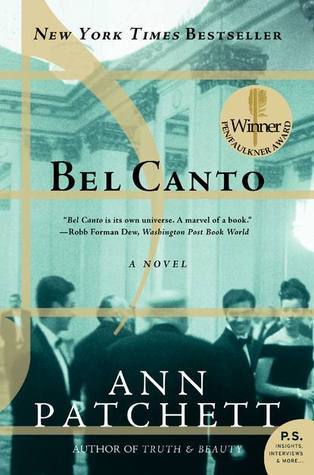- The Good: Slow meditative novel about the beauty of unexpected situations
- The Bad: Difficult ending; potentially over-romanticized situation
- The Literary: Expertly drawn characters
Mr. Hosokawa, a powerful Japanese businessman, is celebrating his birthday at a lavish party in the home of a vice-president, somewhere in South America. Mr. Hosokawa is there for business, but he’s most excited about Roxanne Coss, an opera singer paid to perform for the evening. It’s a wonderful party, until terrorists invade with huge guns and take everyone hostage.
Bel Canto is a slow, romantic, almost meditative novel about the beauty of unexpected situations. The story follows a large cast of characters, including both the hostages and the relatively non-violent terrorists, as friendships develop while they all live together in a single house over a period of months. Negotiations stall as the government refuses to yield. To pass the time and dispel loneliness, the opera singer performs for everyone, softening their situation until they begin to enjoy themselves, isolated from the world, career ambitions and personal lives set aside.
As the hostages and terrorists see each other as individuals and not the enemy, we readers explore the theme of humans as social animals, constructing social brotherhoods under extreme shared circumstances. Social hierarchies dissolve. Most of the terrorists are seen as they truly are, poor rural teenagers who grew up without electricity or access to education, who believe in the dream of fighting for their people.
Structurally the novel is quite simple, emphasizing interpersonal relationships, reverence for music – specifically opera, and the human tendency for hope in disastrous situations. I think some readers may chafe at how romanticized the situation and relationships become, but I find the story poetic and bittersweet. I do think the epilogue is unnecessary and even detracts from the rest of the character arcs, but I’ll likely write it out of my memory.
Upon completing this novel, I’ve read that it’s loosely based on a true story. In 1996 Peru, a Japanese ambassador to Peru was taken hostage during a party. The guerillas held on for 126 days until the home was raided by military force and all the insurgents killed, many after they had surrendered. I suppose Patchett wanted to remove specific mentions of the host country in order to separate her story from historical events. But I think a mention, even in a dedication or postscript, would have honored the those who actually lived and died in this situation.
Highly recommended as a literary fiction read about human nature and the unexpected bonds we form!
